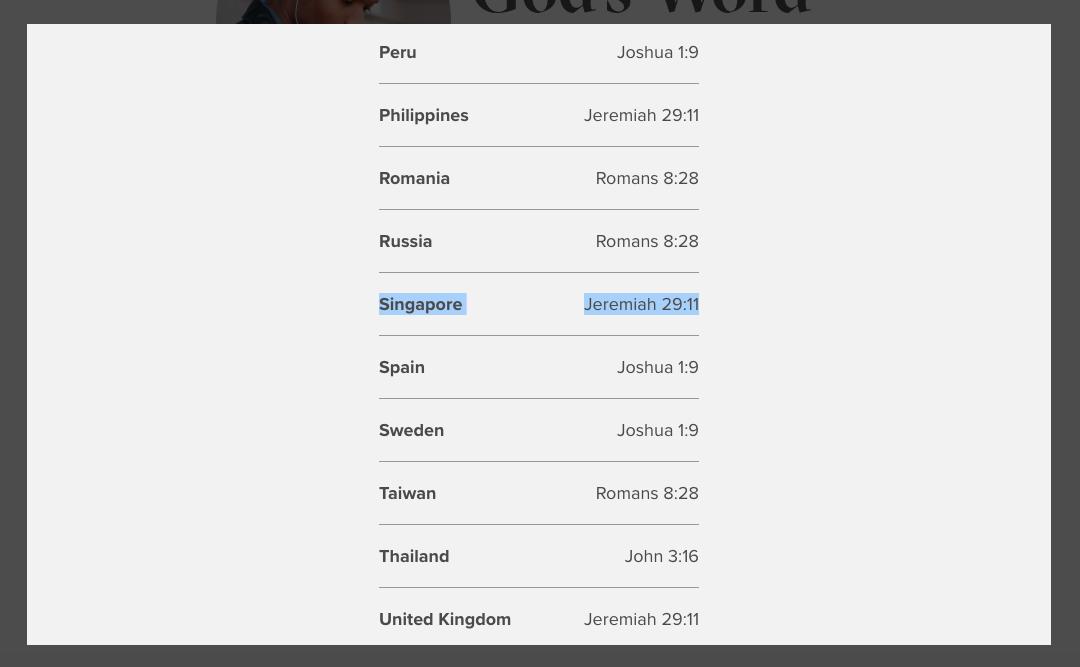It’s official. Singapore’s favourite verse of 2017 is … Jeremiah 29:11.
YouVersion released their year-end review recently, which said we may be living amid the most Bible-engaged generation ever. The summary also shows the top verses around the world – the ones that were shared, bookmarked and highlighted most often by the global Bible App community in 2017.
The verse of the year was Joshua 1:9.

I wonder if Singapore’s top verse of 2017 should raise more concerns than hope.
“For I know the plans I have for you,” declares the Lord, “plans to prosper you and not to harm you, plans to give you hope and a future.” (Jeremiah 29:11)
Growing up in the youth ministry, this verse was widely and commonly quoted. We used it when exams were drawing close, when we had to submit our choices for our school applications. Then we grew older, and this verse was still used when we were job hunting, when we went for job interviews, when our parents went for health screenings …
For the average Singaporean, this verse seems to give some hope and assurance in this fast-paced, cut-throat society. It has all the right words in it: We love planning ahead. We are always so concerned about our future. We want quick solutions.
But while Jeremiah 29:11 is one of our most beloved verses, it’s possibly one of the most misunderstood ones.
We love anything that promises us prosperity. Huat ah! Prosperity in the form of straight A’s. A degree from a prestigious university. Or a high-flying career. Or a #goals kind of relationship.
But while Jeremiah 29:11 is one of our most beloved verses, it’s possibly one of the most misunderstood ones. I’m definitely guilty of having quoted it frequently and written it on many well-wishing cards over the years.
But do we really know what the verse means?
Jeremiah 29:11 was part of a letter written by the prophet Jeremiah for the exiles in Babylon, who were discouraged and disillusioned. They had suffered terribly. They had lost their land, their throne, their temple.
And when they read that line, they probably would have felt … a strange mix of distant hope amid tremendous disappointment.
Because this letter was a reminder to the people of Judah that they would not be returning home anytime soon. Not for 70 years, to be precise, according to Jeremiah 29:10.
The Israelites were exiled due to their own sins. But God had shown incredible mercy and called them to repentance. The exile was a consequence of their actions, meaning their immediate future looked bleak.
But in His grace, He promised them prosperity instead of harm, and a hope and a future.
It was in such a state of despair that this letter was written, as an encouragement to the exiles in a foreign land.
Now, you might ask, so what? Even if the verse is taken out of context, it’s still true to some extent, right?
God does know the plans for each of us, so it’s applicable for those seeking God’s plan for their life, right? Well, yes and no.
Consider the context in which these promises were made. In Jeremiah 28, another prophet named Hananiah makes a bold declaration: God will restore Israel in two years. The tens of thousands of people living in exile will be going home soon. Hang in there!
It is far too easy to take Jeremiah 29 out of context and instead hear in it the promises we want to receive.
Whatever Hananiah said sounded good. It was what people wanted to hear. But … it wasn’t true. God had no plans to make everything better in just two years. Hananiah persuaded the nation to trust in his lies (Jeremiah 28:15), and they believed him easily because it was a semblance of the release from their situation that they were so desperate for.
He had preached rebellion (Jeremiah 28:16): Drawing hope not according to the Word of God, but the wants of man.
All along I’d read Jeremiah 29 like I was listening to Hananiah. I believed that God would work out everything for my benefit soon, and in ways that made sense to me. It is far too easy to take Jeremiah 29 out of context and instead hear in it the promises we want to receive.
We fall so easily into the trap of self-deception.

But this isn’t a dismissal of the love of the verse, because at the heart of it lies an eternal truth: That God really does know what’s in store for you, and His heart is always for the good of those who love Him.
No, the plans that God has for you may not be the plans you want for yourself. But that doesn’t mean His plans aren’t better plans.
We need to be careful of our natural human tendencies to twist God’s promises and plans into caricatures of what they really mean. Here are some ways to help us keep that tendency in check.
HOW CAN WE CORRECTLY HANDLE THE WORD OF GOD?
1. DIG DEEPER
When you know the Word better, you are able to discern what is true and untrue (Hebrews 5:12-14). Discipline yourself; set aside time daily to read the Bible. Take your time to read and understand. Read with a greater sensitivity to context. It’s always quality more than quantity.
2. DISCUSS WITH OTHERS
None of us has a monopoly on truth or insight. Join a cell group to study and discuss the Bible together. Or maybe your church has regular Bible Study meetings. Or consider Bible Study Fellowship, which works across church and denominational lines. As iron sharpens iron, let your community help you to grow. Be open to hearing new perspectives that you otherwise wouldn’t have thought of yourself.
3. DIE TO YOURSELF
The key, I feel, is to commit ourselves to seeking God first and only. By laying down all our pride and desires, we turn our eyes on Him to help us realise that we live within a story much bigger than our own. A story in which God resolves the disappointments of life in ways we can never even imagine.
A story of hope and a future.









